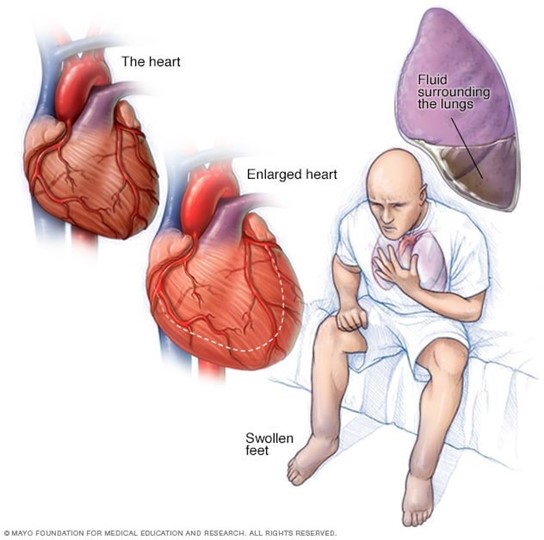A nurse is providing discharge teaching to a client who has a new diagnosis of heart failure. Which of the following instructions should the nurse include in the teaching?
Exercise at least three times per week.
Notify the provider of a weight gain of 0.5 kg (1 lb) in a week.
Take diuretics early in the morning and before bedtime.
Take naproxen for generalized discomfort.
The Correct Answer is A
a. This is appropriate as regular, moderate exercise can help improve cardiovascular health and functional capacity in clients with heart failure. It is essential to discuss appropriate types and levels of exercise based on the individual’s condition.
b. This is incorrect because clients should be instructed to notify the provider if they gain 1 kg (2.2 lbs) in one day or 2 kg (4.4 lbs) in one week. A weight gain of 0.5 kg is not typically a threshold for concern.
c. Take diuretics early in the morning and before bedtime is wrong because it may disrupt the client's sleep patern and cause nocturia. The nurse should advise the client to take diuretics early in the morning and avoid taking them in the evening or at night, unless prescribed otherwise.
d. Take naproxen for generalized discomfort is wrong because naproxen is a nonsteroidal anti-inflammatory drug (NSAID) that can worsen heart failure by causing sodium and water retention, increasing blood pressure, and reducing the effectiveness of diuretics and other heart failure medications. The nurse should advise the client to avoid NSAIDs and use acetaminophen or other alternatives for pain relief, as prescribed by the provider.

Nursing Test Bank
Naxlex Comprehensive Predictor Exams
Related Questions
Correct Answer is B
Explanation
An exercise stress test is a diagnostic procedure that measures the heart's response to physical activity. The client is instructed to walk on a treadmill or pedal a stationary bike while their heart rate, blood pressure, and electrocardiogram are monitored. The test can help detect coronary artery disease, arrhythmias, or other cardiac problems.
The client should follow certain guidelines before the test, such as:
- Avoiding caffeine, nicotine, alcohol, and stimulants for at least 4 hours before the test, as they can affect the heart rate and blood pressure.
- Fasting for at least 2 hours before the test, as eating can affect the blood flow to the heart.
- Getting adequate rest and sleep the night before the test, as fatigue can affect the performance and results of the test.
- Wearing comfortable clothing and shoes that are suitable for exercise.
- Informing the provider of any medications they are taking, as some medications may need to be withheld or adjusted before the test, such as beta blockers, calcium channel blockers, nitrates, or antiarrhythmics. These medications can affect the heart rate and blood pressure and interfere with the interpretation of the test results.
Therefore, the comment made by the client that indicates a need for further teaching is "I'll take my heart medications the morning of my test." The client should consult with their provider about whether they should take their heart medications or not before the test. The other comments made by the client are appropriate and indicate that they understand the pre-test instructions.
Correct Answer is D
Explanation
Choice A reason:
Administering an anticholinesterase medication is not the primary intervention during a myasthenic crisis. While these medications can improve muscle strength in myasthenia gravis, they are not sufficient in the event of a crisis.
Choice B reason:
Pursed lip breathing is a technique used to manage dyspnea but is not adequate for the acute management of a myasthenic crisis, which can involve respiratory muscle paralysis.
Choice C reason:
Vasoconstrictors are not used in the treatment of myasthenic crisis. This condition is not related to vascular issues but to neuromuscular transmission failure leading to respiratory failure.
Choice D reason:
Mechanical ventilation is the correct intervention as it provides the necessary respiratory support when the patient's respiratory muscles are too weak to maintain adequate ventilation.
Whether you are a student looking to ace your exams or a practicing nurse seeking to enhance your expertise , our nursing education contents will empower you with the confidence and competence to make a difference in the lives of patients and become a respected leader in the healthcare field.
Visit Naxlex, invest in your future and unlock endless possibilities with our unparalleled nursing education contents today
Report Wrong Answer on the Current Question
Do you disagree with the answer? If yes, what is your expected answer? Explain.
Kindly be descriptive with the issue you are facing.
